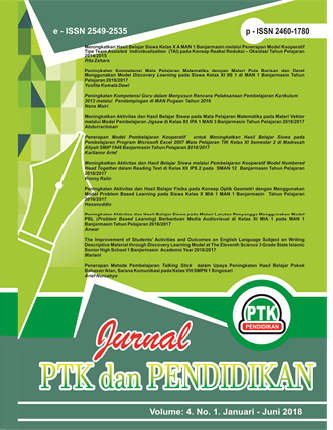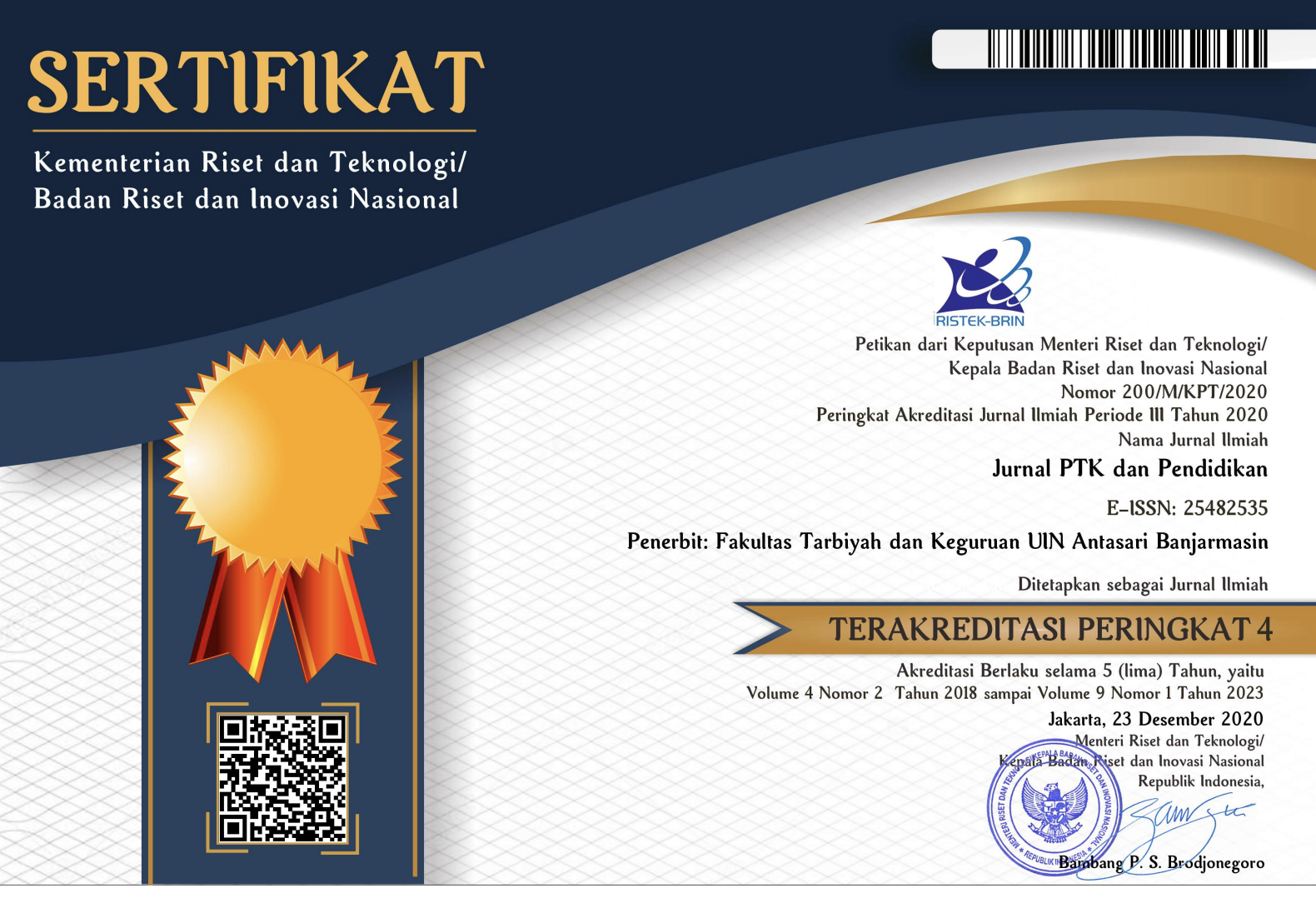Peningkatan Hasil Belajar Siswa Kelas XA MAN 1 Banjarmasin Melalui Penerapan Model Kooperatif Tipe Team Assisted Individualization pada Konsep Reaksi Reduksi –Oksidasi
DOI:
https://doi.org/10.18592/ptk.v4i1.2096Abstract
Research’s aim is to improve the student’s learning outcomes by using cooperative learning type Team Assisted Individualization (TAI) in reaction oxidation-reduction concept. This study used class action researched method with cycle model. The research was done in XA class of MAN 1 Banjarmasin with 36 students in 2014/2015 academic year. The research instrument was learning outcomes test, the teacher and student’s observation sheet, and the students’s response questionnaire. The data were the result of student’s learning outcome, the result of teacher and student’s observation, and student’s response to the study, then it was analyzed by qualitative descriptive. The results showed that by using TAI mode in reaction-oxidation-reduction concept could increase student’s learning outcomes, from grade 67,78 (38,88% ) in cycle I to grade 83,42 (78%) in cycle II.References
Atiek Winarti, M.Pd dkk .2006. Meningkatkan Hasil Belajar Kimia Melalui Penerapan Model Kooperatif Tipe Time Accelerated Individualization (TAI) untuk Mengatasi Heterogenitas Kemampuan Siswa di kelas X SMAN 2 Banjarmasin.
Chairunnisa. 2017. Meningkatkan Motivasi dan Hasil Belajar Siswa Konsep Hidrokarbon dengan Menggunakan Model Pembelajaran Cooperative Script berbantuan Media Adobe Flash pada Siswa Kelas XI MIA-3 MAN 3 Banjarmasin Tahun Pelajaran 2016/2017. Jurnal PTK dan Pendidikan. Vol 3(2): 1-9.
Depdiknas.2003. StandarKompetensi Mata Pelajaran Kimia SMA danMA.Depdiknas. Jakarta.
Herdian. 2009. Model Pembelajaran TAI (Teams Assisted Individualization).http://herdy07.wordpress.com/2009/04/22/model-pembelajaran-tai-team-assisted-individualy.
Ibrahim, H.M. 2000. Pembelajaran Kooperatif. University Press. Surabaya.
Permana, D. 2004. Inti Sari Untuk Kimia SMA. Edisi Revisi. Pustaka Setia. Bandung.
Ratumanan, T.G & Laurens,T. 2003. Evaluasi Hasil Belajar yang relevan dengan Kurikulum Berbasis Kompetensi. Unesa University Press. Surabaya.
Rohani, A. 1997. Media Instruksional Edukatif. Rineka Cipta. Jakarta.
Sadiman, A. S, R. Raharjo, A. Hayono & Raharddjito. 2003. Media Pendidikan.
Slameto. 2003. Belajar dan Faktor-faktor yang Mempengaruhi Belajar. Reneka Cipta, Jakarta.
Slavin, R.E. 1995. Cooperative Learning : Theory, Research and practice, Second Edition. Allyn dan Bacon, Massachusetts.
Sudijono, A. 2002. Pengantar Statistik Pendidikan. PT. Raja Grafindo Persada, Jakarta.
Sudjana. 2005. Metode Statistik. PT. Tarsito, Bandung.
Syah, M. 2004. Psikologi Pendidikan Dengan Pendekatan Baru. Remaja Rosdakarya. Bandung.
Trianto. 2007. Model-Model Pembelajaran Inovatif Berorientasi Konstruktivistik Konsep, Landasan Teoritik-Praktis dan Implementasinya. Prestasi Pustaka, Jakarta.
Downloads
Published
How to Cite
Issue
Section
License
- The right to publication of all journal material published on the Jurnal PTK dan Pendidikan website is held by the editorial board with the author's knowledge (moral rights remain the property of the author).
- The formal legal provisions for access to digital articles of this electronic journal are subject to the terms of the Creative Commons CC BY 4.0 DEED Attribution International (CC BY) license. This license enables reusers to distribute, remix, adapt, and build upon the material in any medium or format, so long as attribution is given to the creator. The license allows for commercial use.
- Printed and electronic published manuscripts are open access for educational, research and library purposes. In addition to these objectives, the editorial board shall not be liable for violations of copyright law.







